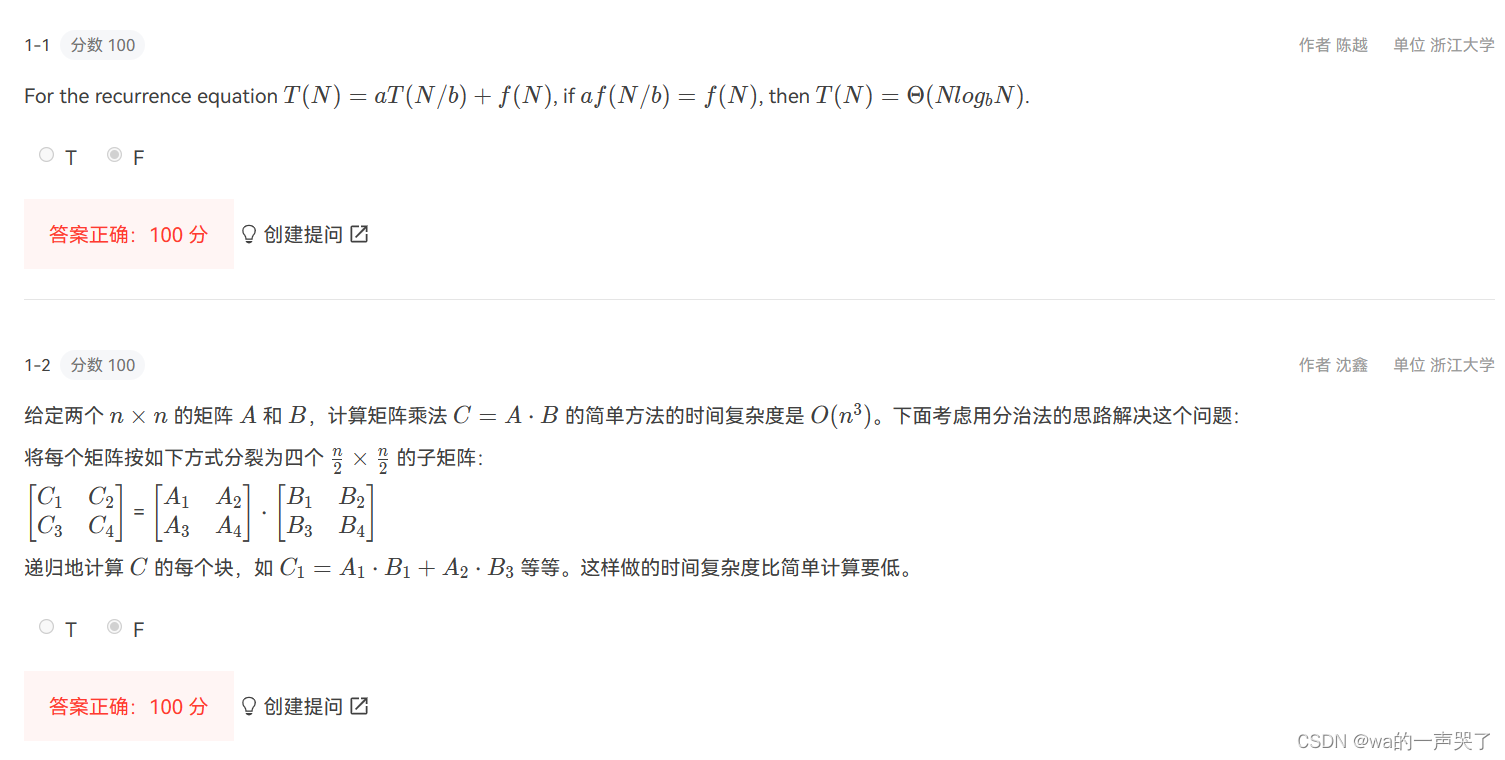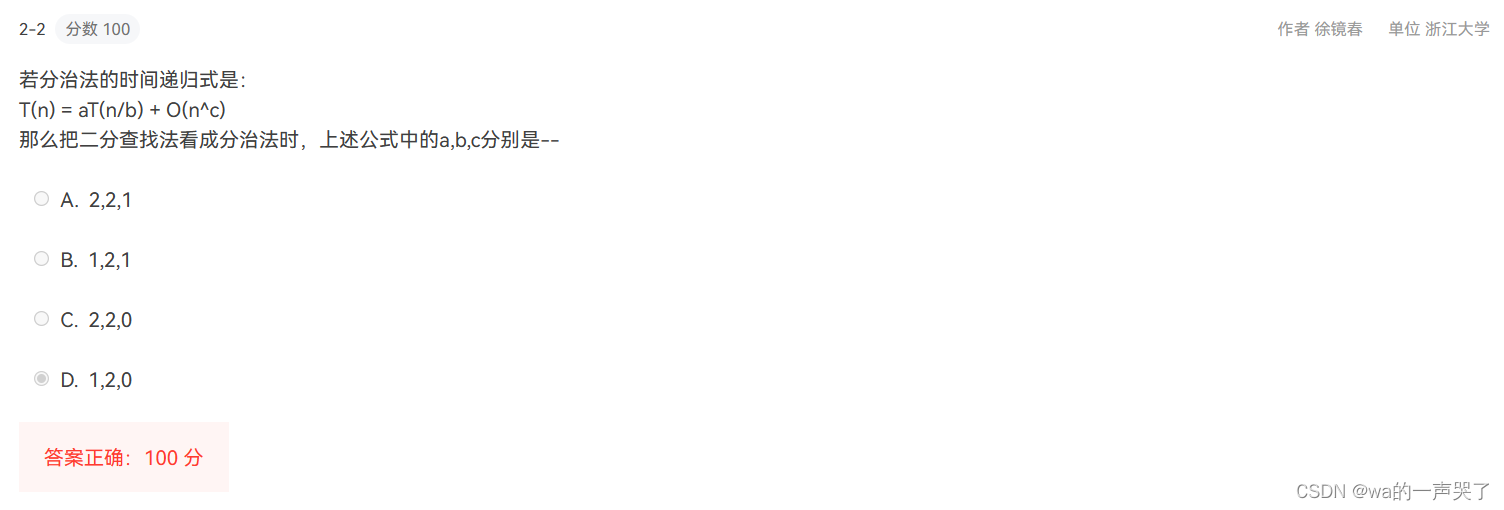郑州大学算法设计与分析实验2
发布时间:2024年01月05日
判断题



1
#include<bits/stdc++.h>
using namespace std;
const int N = 50;
int f[N], n;
int main()
{
// freopen("1.in", "r", stdin);
ios::sync_with_stdio(false);
cin.tie(0);
cout.tie(0);
cin >> n;
f[1] = 1; f[2] = 1;
for(int i = 3; i <= n; ++ i)
f[i] = f[i - 1] + f[i - 2];
cout << f[n];
}
2
#include<bits/stdc++.h>
using namespace std;
const int N = 10000010;
int f[N], n;
int main()
{
// freopen("1.in", "r", stdin);
ios::sync_with_stdio(false);
cin.tie(0);
cout.tie(0);
cin >> n;
f[1] = 1; f[2] = 1;
for(int i = 3; i <= n; ++ i)
f[i] = (f[i - 1] + f[i - 2]) % 998244353;
cout << f[n];
}
3
#include<bits/stdc++.h>
#define LL long long
using namespace std;
const LL mod = 998244353;
LL n;
LL f[3] = {0, 1, 1};
LL a[3][3] = {{0, 0, 0}, {1, 0, 1}, {0, 1, 1}};
void mulself(LL a[3][3])
{
LL c[3][3] = {0};
for(int i = 0; i < 3; ++ i)
for(int j = 0; j < 3; ++ j)
for(int k = 0; k < 3; ++ k)
c[i][j] = (c[i][j] + (LL) a[i][k] * a[k][j]) % mod;
memcpy(a, c, sizeof c);
}
void mul(LL f[3], LL a[3][3])
{
LL c[3] = {0};
for(int i = 0; i < 3; ++ i)
for(int j = 0; j < 3; ++ j)
c[i] = (c[i] + (LL) f[j] * a[j][i]) % mod;
memcpy(f, c, sizeof c);
}
int main()
{
// freopen("2.in", "r", stdin);
ios::sync_with_stdio(false);
cin.tie(0);
cout.tie(0);
cin >> n;
while(n)
{
if(n & 1) mul(f, a);
mulself(a);
n /= 2;
}
cout << f[0] << endl;
}
4
#include <bits/stdc++.h>
#define rep(i,a,b) for(register int i = (a); i <= (b); ++i)
#define fep(i,a,b) for(register int i = (a); i >= (b); --i)
#define ls p<<1
#define rs p<<1|1
#define PII pair<int, int>
#define ll long long
#define ull unsigned long long
#define db double
#define endl '\n'
#define debug(a) cout<<#a<<"="<<a<<endl;
#define IOS ios::sync_with_stdio(false); cin.tie(0); cout.tie(0);
#define INF 0x3f3f3f3f
#define x first
#define y second
using namespace std;
const int N = 1e4 + 10;
char a[N][N];
int n;
void solve(int n, int x, int y)
{
if(n == 1)
{
a[x][y] = 'X';
return;
}
int m = pow(3, n - 2);
solve(n - 1, x, y);
solve(n - 1, x, y + 2 * m);
solve(n - 1, x + m, y + m);
solve(n - 1, x + 2 * m, y);
solve(n - 1, x + 2 * m, y + 2 * m);
}
int main()
{
// freopen("2.in", "r", stdin);
ios::sync_with_stdio(false);
cin.tie(0);
cout.tie(0);
while(cin >> n)
{
if(n == -1) break;
int q = pow(3, n - 1);
for(int i = 0; i < q; ++ i)
{
for(int j = 0; j < q; ++ j)
a[i][j] = ' ';
a[i][q] = '\0';
}
solve(n, 0, 0);
for(int i = 0; i < q; ++ i)
cout << a[i] << endl;
cout << '-' << endl;
}
return 0;
}
5
#include<bits/stdc++.h>
#define LL long long
using namespace std;
const int N = 100010;
int n, L;
double a[N], b[N], s[N];
bool check(double mid)
{
for(int i = 1; i <= n; ++ i)
{
b[i] = a[i] - mid;
s[i] = s[i - 1] + b[i];
}
double minn = 1e9;
for(int i = L; i <= n; ++ i)
{
minn = min(minn, s[i - L]);
if(s[i] - minn >= 0) return true;
}
return false;
}
void solve()
{
cin >> n >> L;
for(int i = 1; i <= n; ++ i) cin >> a[i];
double l = 0, r = 1e9;
while(r - l >= 1e-5)
{
double mid = (l + r) / 2;
if(check(mid)) l = mid;
else r = mid;
}
cout << (int)(r * 1000);
}
int main()
{
// freopen("2.in", "r", stdin);
ios::sync_with_stdio(false);
cin.tie(0);
cout.tie(0);
solve();
}
6
#include<bits/stdc++.h>
#define LL long long
using namespace std;
int n, k;
map<int, int>cnt;
void solve()
{
cin >> n;
for(int i = 1; i <= n; ++ i)
{
int id; cin >> id;
cnt[id] ++;
}
cin >> k;
while(k --)
{
int id; cin >> id;
if(cnt.find(id) == cnt.end()) puts("No");
else puts("Yes");
}
}
int main()
{
// freopen("2.in", "r", stdin);
ios::sync_with_stdio(false);
cin.tie(0);
cout.tie(0);
solve();
}
7
#include <bits/stdc++.h>
#define rep(i,a,b) for(register int i = (a); i <= (b); ++i)
#define fep(i,a,b) for(register int i = (a); i >= (b); --i)
#define ls p<<1
#define rs p<<1|1
#define PII pair<int, int>
#define ll long long
#define ull unsigned long long
#define db double
#define endl '\n'
#define debug(a) cout<<#a<<"="<<a<<endl;
#define IOS ios::sync_with_stdio(false); cin.tie(0); cout.tie(0);
#define INF 0x3f3f3f3f
#define x first
#define y second
using namespace std;
const int N = 1e4 + 10;
LL n, x[N], y[N], ans;
int main()
{
// freopen("2.in", "r", stdin);
ios::sync_with_stdio(false);
cin.tie(0);
cout.tie(0);
cin >> n;
for(int i = 0; i < n; ++ i) cin >> x[i] >> y[i];
sort(x, x + n);
sort(y, y + n);
for(int i = 0; i < n; ++ i)
x[i] -= (i + 1);
sort(x, x + n);
int mid_x = x[n / 2], mid_y = y[n / 2];
for(int i = 0; i < n; ++ i)
ans += abs(x[i] - mid_x),
ans += abs(y[i] - mid_y);
cout << ans << endl;
return 0;
}
8
#include <bits/stdc++.h>
#define rep(i,a,b) for(register int i = (a); i <= (b); ++i)
#define fep(i,a,b) for(register int i = (a); i >= (b); --i)
#define ls p<<1
#define rs p<<1|1
#define PII pair<int, int>
#define ll long long
#define ull unsigned long long
#define db double
#define endl '\n'
#define debug(a) cout<<#a<<"="<<a<<endl;
#define IOS ios::sync_with_stdio(false); cin.tie(0); cout.tie(0);
#define INF 0x3f3f3f3f
#define x first
#define y second
using namespace std;
const int N = 1e4 + 10;
int n, x, a[N];
int main()
{
IOS
cin>>n;
for(int i = 0; i < n; i ++)
cin >> x >> a[i];
sort(a,a+n);
int min=0;
for(int i=0; i<n; i++)
min += (int)fabs(a[i]-a[n/2]);
cout<<min<<endl;
return 0;
}
9
#include <bits/stdc++.h>
#define LL long long
using namespace std;
const int N = 1e6 + 10, INF = 1 << 30;
struct wy
{
double x, y;
}p[N];
int n, tmp[N], pos1, pos2;
double ass;
double dis(wy a, wy b)
{
double x = (a.x - b.x) * (a.x - b.x);
double y = (a.y - b.y) * (a.y - b.y);
return sqrt(x + y);
}
bool cmp1(wy a, wy b)
{
if(a.x == b.x) return a.y < b.y;
return a.x < b.x;
}
bool cmp2(int a, int b)
{
return p[a].y < p[b].y;
}
double solve(int l, int r)
{
if(l == r) return INF;
int mid = (l + r) >> 1;
double d = INF;
d = min(solve(l, mid), solve(mid + 1, r));
int k = 0;
for(int i = l; i <= r; ++ i)
if(fabs(p[mid].x - p[i].x) < d)
tmp[++ k] = i;
sort(tmp + 1, tmp + 1 + k, cmp2);
for(int i = 1; i <= k; ++ i)
for(int j = i + 1; j <= k && p[tmp[j]].y - p[tmp[i]].y < d; ++ j)
{
double new_d = dis(p[tmp[i]], p[tmp[j]]);
d=min(new_d,d);
if(d<ass)
{
ass=d;
pos1 = tmp[i];
pos2 = tmp[j];
}
}
return d;
}
int main()
{
// freopen("1.in", "r", stdin);
scanf("%d", &n);
for(int i = 1; i <= n; ++ i) scanf("%lf%lf", &p[i].x, &p[i].y);
sort(p + 1, p + 1 + n, cmp1);
ass=1e18;
double ans = solve(1, n);
if(p[pos1].x + p[pos1].y > p[pos2].x + p[pos2].y) swap(pos1, pos2);
printf("(%.2f,%.2f),(%.2f,%.2f),miniDist=%.3f", p[pos1].x, p[pos1].y, p[pos2].x, p[pos2].y, ans);
return 0;
}
文章来源:https://blog.csdn.net/weixin_61426225/article/details/135397813
本文来自互联网用户投稿,该文观点仅代表作者本人,不代表本站立场。本站仅提供信息存储空间服务,不拥有所有权,不承担相关法律责任。 如若内容造成侵权/违法违规/事实不符,请联系我的编程经验分享网邮箱:chenni525@qq.com进行投诉反馈,一经查实,立即删除!
本文来自互联网用户投稿,该文观点仅代表作者本人,不代表本站立场。本站仅提供信息存储空间服务,不拥有所有权,不承担相关法律责任。 如若内容造成侵权/违法违规/事实不符,请联系我的编程经验分享网邮箱:chenni525@qq.com进行投诉反馈,一经查实,立即删除!
最新文章